小升初英语动词及时态课件
图片预览

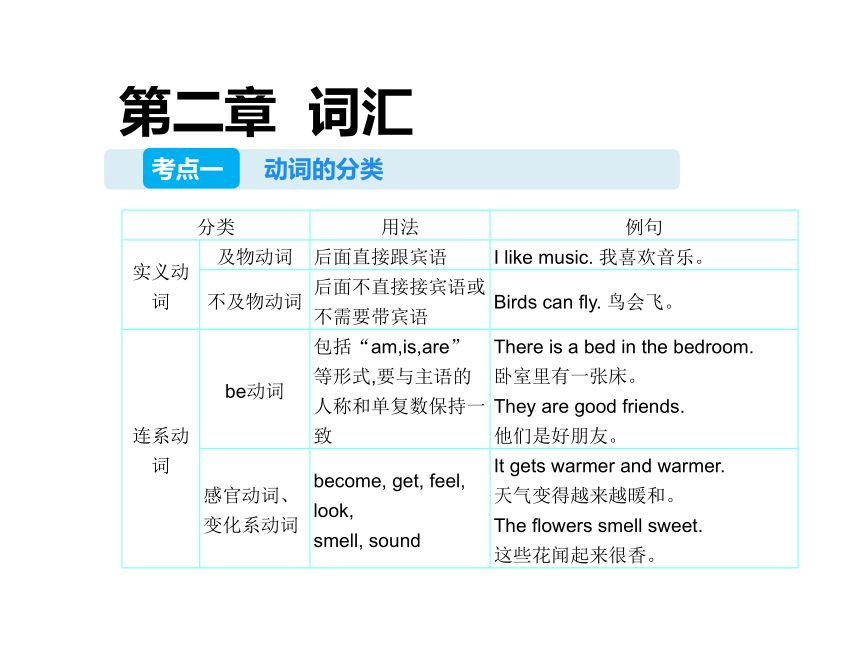
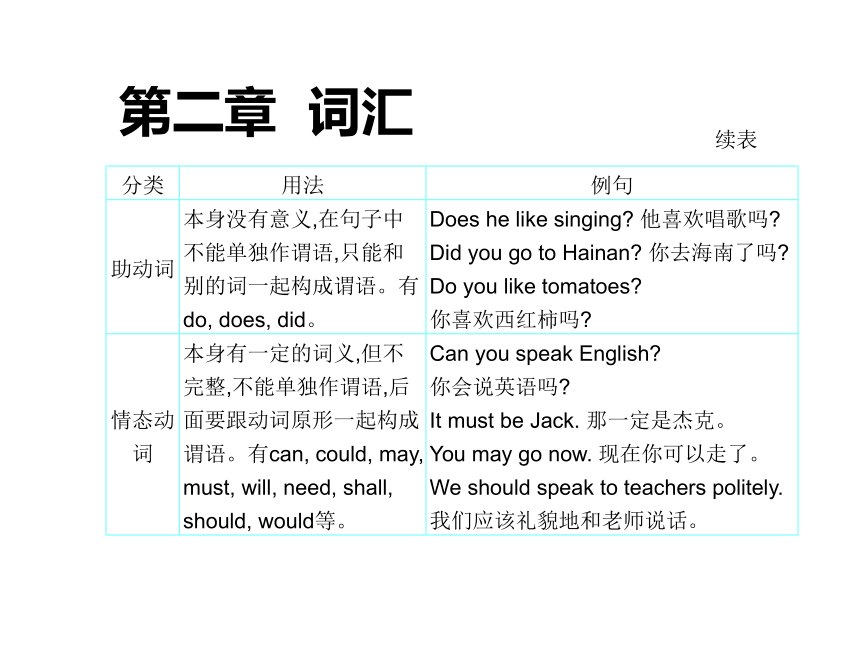
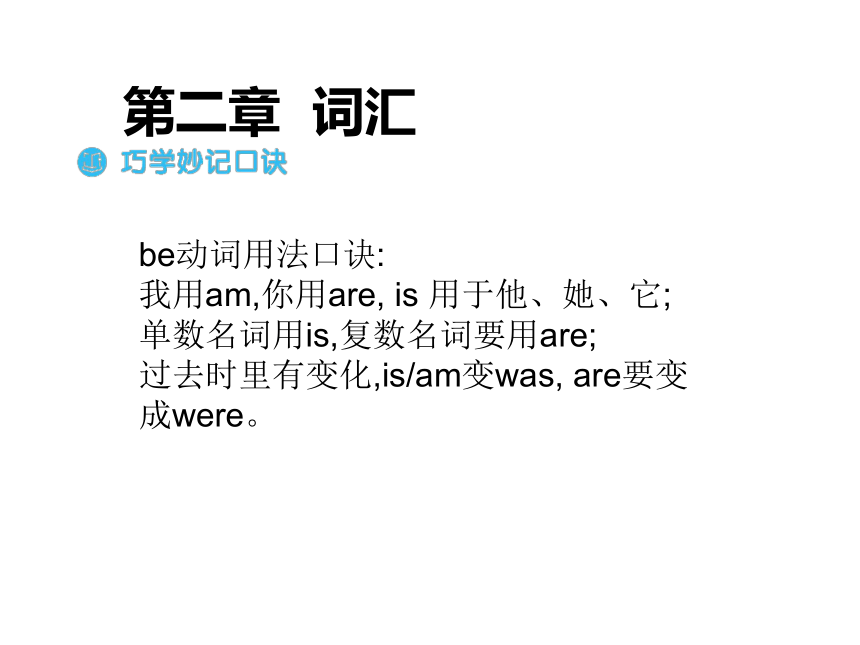
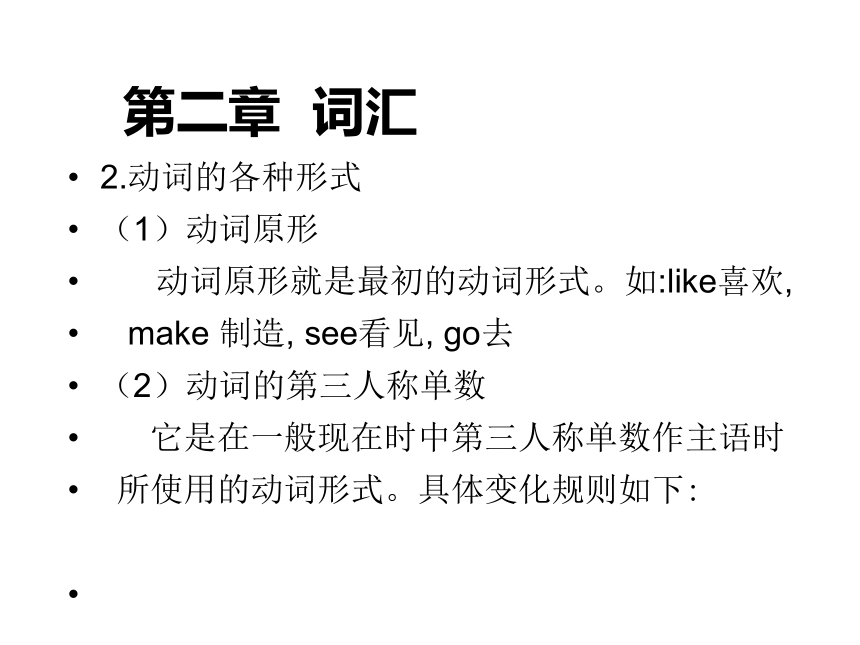
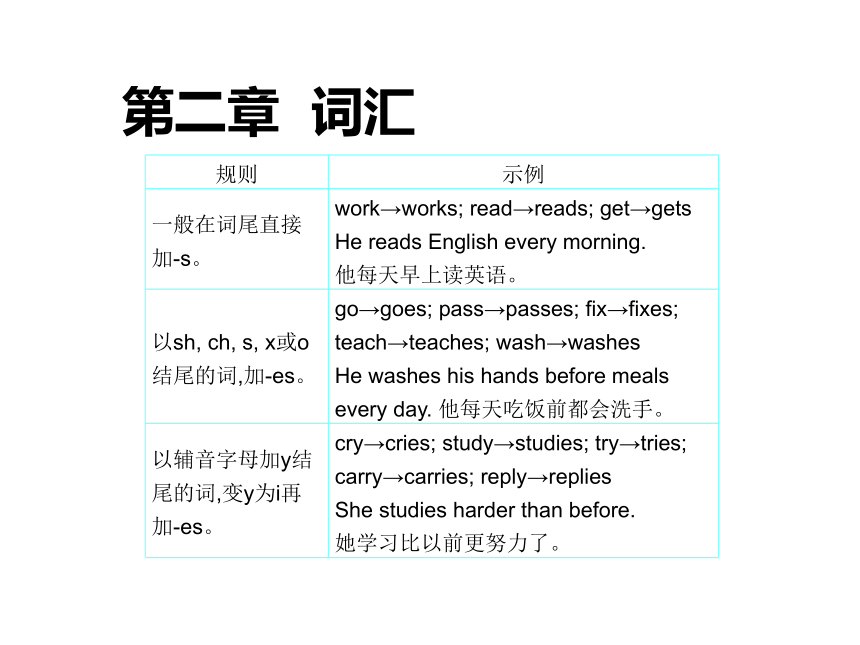
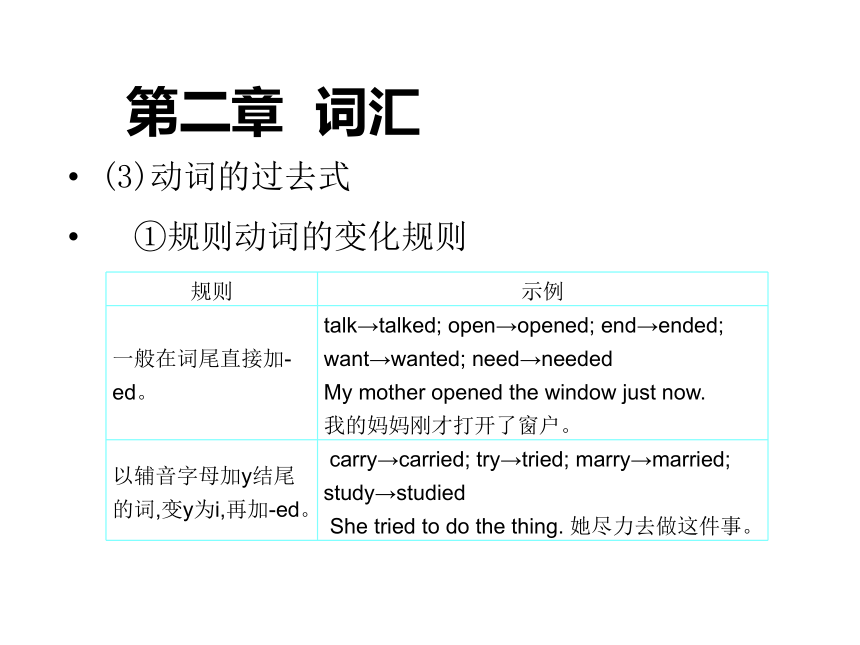
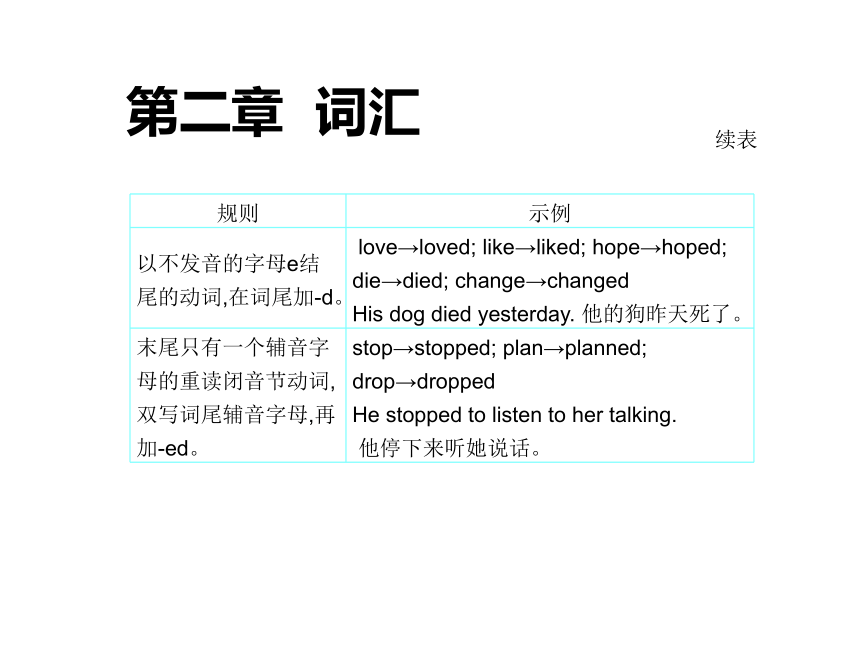
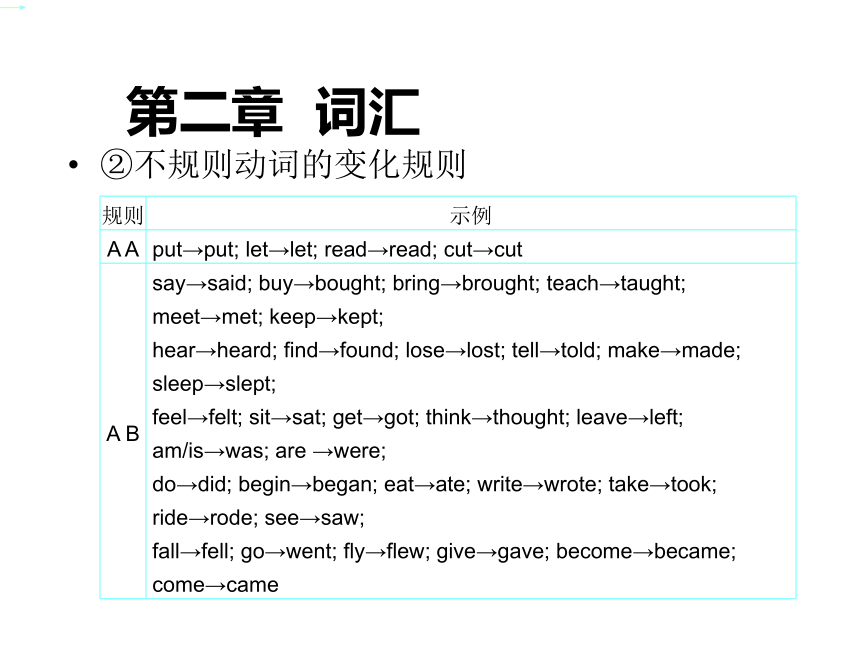
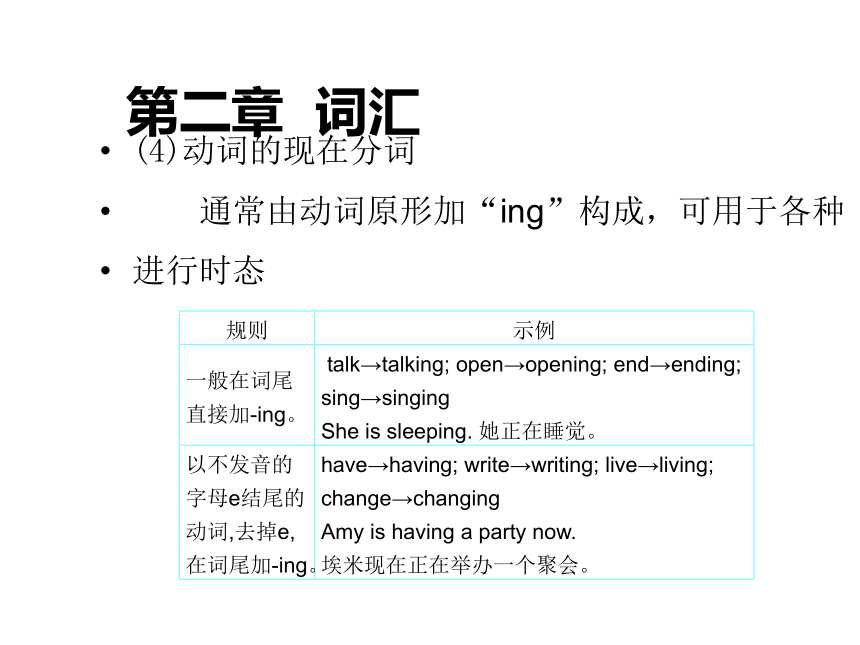

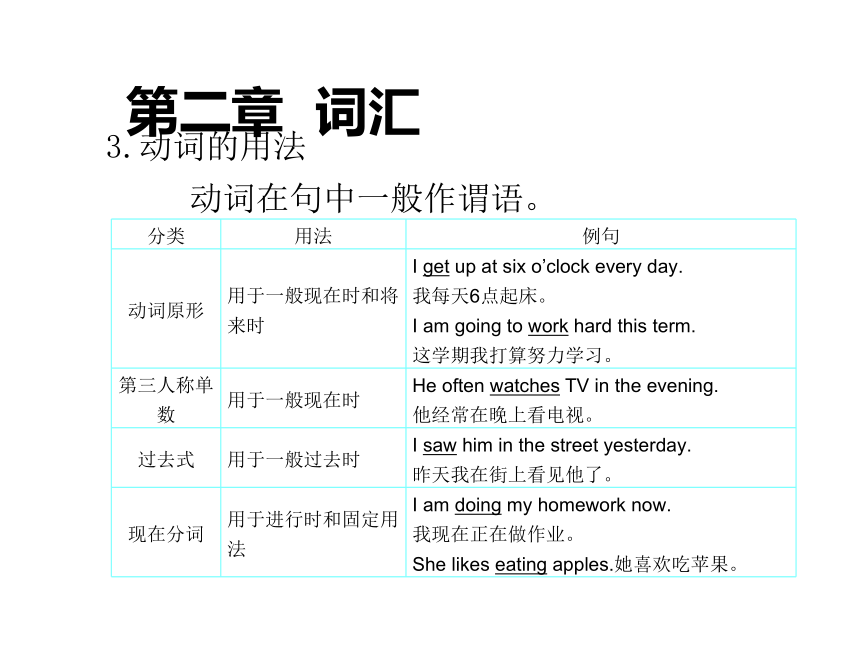
文档简介
第二章 词汇
第 讲 动词及时态
7
动词是表示动作行为的词,主要有实义动词、连系动词、助动词和情态动词四种。
2020小升初专题复习 通用版
第二章 词汇
考点一
动词的分类
分类
用法
例句
实义动词
及物动词
后面直接跟宾语
I like music. 我喜欢音乐。
不及物动词
后面不直接接宾语或不需要带宾语
Birds can fly. 鸟会飞。
连系动词
be动词
包括“am,is,are”等形式,要与主语的人称和单复数保持一致
There is a bed in the bedroom.
卧室里有一张床。
They are good friends.
他们是好朋友。
感官动词、变化系动词
become, get, feel, look,
smell, sound
It gets warmer and warmer.
天气变得越来越暖和。
The flowers smell sweet.
这些花闻起来很香。
第二章 词汇
分类
用法
例句
助动词
本身没有意义,在句子中不能单独作谓语,只能和别的词一起构成谓语。有do, does, did。
Does he like singing? 他喜欢唱歌吗?
Did you go to Hainan? 你去海南了吗?
Do you like tomatoes?
你喜欢西红柿吗?
情态动词
本身有一定的词义,但不完整,不能单独作谓语,后面要跟动词原形一起构成谓语。有can, could, may, must, will, need, shall, should, would等。
Can you speak English?
你会说英语吗?
It must be Jack. 那一定是杰克。
You may go now. 现在你可以走了。
We should speak to teachers politely.
我们应该礼貌地和老师说话。
续表
第二章 词汇
be动词用法口诀:
我用am,你用are, is 用于他、她、它;
单数名词用is,复数名词要用are;
过去时里有变化,is/am变was, are要变成were。
第二章 词汇
2.动词的各种形式
(1)动词原形
动词原形就是最初的动词形式。如:like喜欢,
make 制造, see看见, go去
(2)动词的第三人称单数
它是在一般现在时中第三人称单数作主语时
所使用的动词形式。具体变化规则如下:
第二章 词汇
规则
示例
一般在词尾直接加-s。
work→works; read→reads; get→gets
He reads English every morning.
他每天早上读英语。
以sh, ch, s, x或o结尾的词,加-es。
go→goes; pass→passes; fix→fixes; teach→teaches; wash→washes
He washes his hands before meals every day. 他每天吃饭前都会洗手。
以辅音字母加y结尾的词,变y为i再加-es。
cry→cries; study→studies; try→tries; carry→carries; reply→replies
She studies harder than before.
她学习比以前更努力了。
第二章 词汇
(3)动词的过去式
①规则动词的变化规则
规则
示例
一般在词尾直接加-ed。
talk→talked; open→opened; end→ended; want→wanted; need→needed
My mother opened the window just now.
我的妈妈刚才打开了窗户。
以辅音字母加y结尾的词,变y为i,再加-ed。
carry→carried; try→tried; marry→married; study→studied
She tried to do the thing. 她尽力去做这件事。
第二章 词汇
规则
示例
以不发音的字母e结尾的动词,在词尾加-d。
love→loved; like→liked; hope→hoped; die→died; change→changed
His dog died yesterday. 他的狗昨天死了。
末尾只有一个辅音字母的重读闭音节动词,双写词尾辅音字母,再加-ed。
stop→stopped; plan→planned; drop→dropped
He stopped to listen to her talking.
他停下来听她说话。
续表
第二章 词汇
②不规则动词的变化规则
规则
示例
A A
put→put; let→let; read→read; cut→cut
A B
say→said; buy→bought; bring→brought; teach→taught; meet→met; keep→kept;
hear→heard; find→found; lose→lost; tell→told; make→made; sleep→slept;
feel→felt; sit→sat; get→got; think→thought; leave→left; am/is→was; are →were;
do→did; begin→began; eat→ate; write→wrote; take→took; ride→rode; see→saw;
fall→fell; go→went; fly→flew; give→gave; become→became; come→came
第二章 词汇
(4)动词的现在分词
通常由动词原形加“ing”构成,可用于各种
进行时态
规则
示例
一般在词尾直接加-ing。
talk→talking; open→opening; end→ending; sing→singing
She is sleeping. 她正在睡觉。
以不发音的字母e结尾的动词,去掉e,在词尾加-ing。
have→having; write→writing; live→living; change→changing
Amy is having a party now.
埃米现在正在举办一个聚会。
第二章 词汇
规则
示例
末尾只有一个辅音字母的重读闭音节动词,双写词尾辅音字母,再加-ing。
put→putting; plan→planning; stop→stopping; begin→beginning; swim→swimming; run→running
I am swimming in a pool.
我正在游泳池里游泳。
续表
第二章 词汇
3.动词的用法
动词在句中一般作谓语。
分类
用法
例句
动词原形
用于一般现在时和将来时
I get up at six o’clock every day.
我每天6点起床。
I am going to work hard this term.
这学期我打算努力学习。
第三人称单数
用于一般现在时
He often watches TV in the evening.
他经常在晚上看电视。
过去式
用于一般过去时
I saw him in the street yesterday.
昨天我在街上看见他了。
现在分词
用于进行时和固定用法
I am doing my homework now.
我现在正在做作业。
She likes eating apples.她喜欢吃苹果。
第二章 词汇
4.常用动词性短语
go to the park
去公园
go to the hospital 去医院
keep quiet
保持安静
clean the windows 擦窗户
keep off the grass
不践踏草坪
feel ill 感觉病了
open the mouth
张开嘴
go to see a doctor
去看医生
climb trees 爬树
have a good rest
好好休息
do homework
做家庭作业
take some medicine 吃药
stay in bed
待在床上
show … to …
出示……给……看
cook food 做饭
第二章 词汇
续表
grow flowers
种花
collect Chinese stamps
收集中国邮票
collect stamps
收集邮票
make clothes
做衣服
go shopping 购物
take photos 拍照
wash clothes
洗衣服
dance beautifully
跳舞跳得美
walk carefully
小心走路
live in 居住在
speak loudly 大声地说
sit quietly 安静地坐
write a letter
写信
take the No.5 bus
乘5路公共汽车
run fast 跑得快
write an email
写电子邮件
be late for school 上学迟到
jump high 跳得高
第二章 词汇
续表
come down 下来
play basketball 打篮球
play football 踢足球
ride a bike
骑自行车
open the box 打开盒子
come here 过来
go to school
去上学
have a music lesson
上一节音乐课
buy fruit 买水果
be free 有空
have some juice 喝点果汁
get up 起床
have a look
看一看
sing a song 唱首歌,唱歌
look happy
看起来快乐
go and see
去看看
write the new words
写新单词
follow me 跟着我
第二章 词汇
续表
watch TV 看电视
play computer games
打电脑游戏
make a puppet
做木偶
play the violin
拉小提琴
help me with my maths
帮助我学习数学
open the door 开门
play the guitar
弹吉他
make a model plane
做飞机模型
read a book 读书
listen to music
听音乐
sweep the floor 扫地
drink water 喝水
play ping-pong 打乒乓球
draw a picture 画一幅画
do housework
做家务
第二章 词汇
动词句中表动作,不同种类有四个;
系动助动情动加实动,分清楚后更好用;
动词句中作谓语,各种形式意不同;
用于现在和将来,三单要把-s加;
现在分词表进行,某些固定也能用;
-ed用来表过去,过去时中常见到。
一、根据要求写单词。
(一)写出下列动词的第三人称单数形式。
1.drink _______ 2.study _______
3.pass _______ 4.carry _______
5.wash _______ 6.write _______
7.run _______ 8.miss _______
9.get ________
第二章 词汇
drinks
studies
passes
carries
washes
writes
runs
misses
gets
(二)写出下列动词的现在分词。
1.put _______ 2.write _______
3.read _______ 4. make _______
5.buy _______ 6.take _______
7.listen _______ 8.teach _______
9.play ________
第二章 词汇
putting
writing
reading
making
buying
taking
listening
teaching
playing
(三)写出下列动词的过去式。
1.find _______ 2.come _______
3.see _______ 4. ride _______
5.go _______ 6.eat_______
7.tell _______ 8.make _______
9.hurt ________
第二章 词汇
found
come
saw
rode
went
ate
told
made
hurt
第二章 词汇
二、(2019北京东城)读短语,找出与图片内容
相符的短语,将标号填在括号内。
A.stay in bed B.drink water C.catch a cold D.save water E.go fishing
第二章 词汇
2.
( )
5.
1.
4.
3.
( )
( )
( )
( )
A
E
D
C
B
三、用所给单词或短语的适当形式填空。
1.Hurry up! Your mother __________
(wait) for you at the school gate.?
2.I __________(not feel) very well
yesterday.?
3.Both he and I ________(be) teachers.?
is waiting
第二章 词汇
didn’t feel
are
4.What _______his father usually
_______(do) on Sundays??
5.________ you _______________
(see) a film tomorrow morning??
第二章 词汇
does
do
Are/Will
going to see/see
第二章 词汇
考点二
字母的分类
不同的时态用以表示不同的时间与方式。时态是表示行为、动作、状态在各种时间条件下的一种形式。在小学阶段,我们主要学习了四种时态: 一般现在时、一般过去时、现在进行时、一般将来时。
第二章 词汇
第二章 词汇
1.时态的构成
时态
分类
构成
例句
一
般
现
在
时
肯定句
主语+系动词is/are/am+其他.
I am a Chinese boy.
我是一个中国男孩。
主语+实义动词+其他.
Li Lei stays with his friends.
李磊和他的朋友们在一起。
主语+情态动词+动词原形(+其他).
They can jump.他们会跳。
否定句
主语+系动词is/are/am+not+其他.
Jim is not from Sydney.
吉姆不是来自悉尼。
第二章 词汇
时态
分类
构成
例句
一
般
现
在
时
否定句
主语+助动词do/does+not+动词原形+其他.
The Greens both do not like going shopping.
格林夫妇都不喜欢购物。
主语+情态动词+not+动词原形(+其他).
He can’t clean the windows.
他不会擦窗户。
一般疑
问句
系动词Is/Are/Am+主语+其他?
Is he strict?他严厉吗?
助动词Do/Does+主语+动词原形+其他?
Do you like country music?
你喜欢乡村音乐吗?
情态动词+主语+动词原形+其他?
May I use your telephone?
我可以用一下你的电话吗?
续表
第二章 词汇
时态
分类
构成
例句
一
般
现
在
时
特殊疑
问句
特殊疑问词+系动词is/are/am+主语+其他?
What’s your mother like?
你的妈妈是什么样的?
特殊疑问词+助动词do/does+主语+动词原形+其他?
What do you usually do on weekends?
你通常在周末做什么?
特殊疑问词+情态动词+主语+动词原形+其他?
What can you do?你会做什么?
一
般
过
去
时
肯定句
主语+系动词was/were+其他.
I was born on a cold night.
我出生在一个寒冷的夜里。
主语+实义动词的过去式+其他.
I went there last Sunday.
上星期日我去那儿了。
续表
第二章 词汇
时态
分类
构成
例句
一
般
过
去
时
否定句
主语+系动词was/were+not+其他.
He was not there yesterday.
昨天他没在那儿。
主语+助动词did+not+动词原形+其他.
They didn’t have dinner at home.
他们没有在家里吃晚饭。
一般疑
问句
系动词Was/Were+主语+其他?
Were you never late for school?
你上学从没迟到过吗?
助动词Did+主语+动词原形+其他?
Did you get up at seven this morning?
你今天早晨七点起床的吗?
续表
第二章 词汇
时态
分类
构成
例句
一
般
过
去
时
特殊疑
问句
特殊疑问词+did+主语+动词原形+其他?
What did you do yesterday?你昨天做什么了?
特殊疑问词+was/were+主语+其他?
Where were you yesterday?昨天你在哪儿?
现
在
进
行
时
肯定句
主语+系动词be+现在分词+其他.
We are watching TV.
我们正在看电视。
否定句
主语+系动词be+not+现在分词+其他.
We are not doing our homework.
我们没有在做作业。
一般疑
问句
系动词Be+主语+现在分词+其他?
Are you watching TV?
你们在看电视吗?
续表
第二章 词汇
时态
分类
构成
例句
现
在
进
行
时
特殊疑
问句
特殊疑问词+be+现在分词+其他?
What are you doing now?
你现在正在做什么?
一
般
将
来
时
肯定句
主语+is/am/are going to+动词原形+其他.
They are going to visit the car factory next
Sunday.他们计划下周日参观那个汽车工厂。
主语+will/shall+动词原形+其他.
They will give us thirty books.
他们将给我们30本书。
续表
第二章 词汇
时态
分类
构成
例句
一
般
将
来
时
否定句
主语+is/am/are+not+going to+动词原形+其他.
We aren’t going to have a dancing class this
afternoon. 今天下午我们不打算上舞蹈课。
主语+will/shall+not+动词原形+其他.
He will not be there at ten tomorrow morning.
明天上午十点他将不在那儿。
一般疑
问句
Is/Am/Are+主语+going to+动词原形+其他?
Are you going to read books tonight?
你今天晚上打算读书吗?
续表
第二章 词汇
时态
分类
构成
例句
一
般
将
来
时
一般疑
问句
Will/Shall+主语+动词原形+其他?
Will you stay at home with us tomorrow?
明天你将和我们一起待在家里吗?
特殊疑
问句
特殊疑问词+一般疑问句?
When will your father be back?
你爸爸将什么时候回来?
续表
第二章 词汇
2.时态的应用
时态
关键词
定义
例句
一般现在时
always,
often,
usually,
sometimes,
every day等。
表示现在习惯或经常性的动作
I often do my homework at home.
我经常在家做作业。
表示永恒不变的普遍真理、科学事实或格言
The earth goes around the sun.
地球绕着太阳转。
表示现在的状态或主语具备的性格或能力
He likes Chinese very much.
他非常喜欢语文。
第二章 词汇
续表
时态
关键词
定义
例句
现在进行时
now, listen,
look等。
说话瞬间正在进行或发生的动作,常与“now(现在)”“look(看)”“listen(听)”等词连用
Listen! She is singing an English song.听!她正在唱一首英文歌。
当前一段时间或现阶段正在进行的动作,后面有“this week” “these days”等时间状语
It’s getting warmer and warmer these days.
这几天天气变得越来越暖和了。
用现在进行时表示按计划、安排近期内即将发生的动作
The train is coming.
火车要来了。
第二章 词汇
续表
时态
关键词
定义
例句
一般过去时
yesterday,
last week,
an hour ago,
just now等。
发生在过去的动作或存在于过去的状态
He played computer games last night.
昨晚他玩电脑游戏了。
在确定的过去时间里所发生的动作或存在的状态
When I was a child, I often played football in the park. 当我还是个孩子时,我经常在公园里踢足球。
第二章 词汇
续表
时态
关键词
定义
例句
一般将来时
tomorrow,
next week,
this evening等。
将要发生的动作或状态
She will have a picnic tomorrow.
明天她将举行一次野餐。
表示将来经常会发生的动作
It’ll snow in Beijing in winter.
北京的冬天会下雪。
表示一种倾向
Look at these black clouds. It is going to rain. 看这些乌云,要下雨了。
第二章 词汇
3.各种时态的句型转换
句式
时态
肯定句
否定句
一般疑问句
一般
现在时
be 动词
am/is/are
am/is/are+not
Am/Is/Are+主语+其他?
实义动词
do/does
don’t/doesn’t+do
Do/Does+主语+do+其他?
现在
进行时
动词
am/is/are+
doing
am/is/are+not+
doing
Am/Is/Are+主语+doing+其他?
句式
时态
肯定句
否定句
一般疑问句
一般
过去时
be动词
was/were
was/were+not
Was/Were+主语+其他?
实义动词
did
didn’t+do
Did+主语+do+其他?
一般
将来时
动词
be going to+do
be+not+going to+do
Am/Is/Are+主语+going to+do+其他?
shall/will+do
shall/will+not+do
Shall/Will+主语+do+其他?
第二章 词汇
续表
第二章 词汇
英语中四时态,现在进行过去和将来;
现在时用原形,主语三单时要变形;
进行时表正在,动词-ing的尾巴莫忘带;
过去时态表过去,动词后的-ed别忘记;
将来时态中,动词原形用。
第二章 词汇
看图,完成对话。
第1题图
第4题图
第2题图
第3题图
第5题图
第二章 词汇
1.—What do you do in your music class?
—I ______the ______and sing songs.?
2.—What did your mother do yesterday?
—She _______the house.?
3.—What are they doing now?
—They are _______ _______.?
play
piano
cleaned
playing
football
第二章 词汇
4.—How are you going there?
—I’m _______there by _______.?
5.—Did Sam go hiking last weekend?
—No, he _______his _______.
going
bus
rode
bike
第二章 词汇
【示例1】( )—Does Nancy watch TV
every evening?
—_____.?
A.Yes, he does
B.No, he doesn’t
C.Yes, she does
D.No, she didn’t
第二章 词汇
【精析】通过常识可知,Nancy 是个女孩,因此
答语中应用“she”,从而排除 A和B。
而D选项中用的是一般过去时,因此也
可以排除。
【答案】C
( )Linda ______like singing or
dancing.?
A.do B.is
C.don’t D.doesn’t
第二章 词汇
【针对性练习1】
D
第二章 词汇
【示例2】 ( )—What are you doing now?
—I ______.?
A.skating B.am skating
C.is skating D.are skating
第二章 词汇
【精析】通过阅读题干和选项,我们可以理
解题意为“你正在干什么?”
“我正在溜冰。”应是现在进行时
的句子。其结构应为
“am/is/are+doing”,而主语是
“I”,应用“am+doing”的结构。
【答案】B
第二章 词汇
【针对性练习2】
Look! They _____________(are
running/ran) after a dog.?
are running
第二章 词汇
【精析】阅读题干,从时间状语“last week (上周)”
可知,事情发生在过去,因此应用一般过去时,句型应
为“主语+实义动词的过去式+其他.”故选C。
【答案】C
【示例3】( )John _____shopping with his
mother last week.?
A.goes B.will go
C.went D.is going
第二章 词汇
【针对性练习3】
( )I ______my clothes last night.?
A.wash B.am washing
C.will wash D.washed
D
谢谢
21世纪教育网(www.21cnjy.com) 中小学教育资源网站
有大把高质量资料?一线教师?一线教研员?
欢迎加入21世纪教育网教师合作团队!!月薪过万不是梦!!
详情请看:
https://www.21cnjy.com/help/help_extract.php
第 讲 动词及时态
7
动词是表示动作行为的词,主要有实义动词、连系动词、助动词和情态动词四种。
2020小升初专题复习 通用版
第二章 词汇
考点一
动词的分类
分类
用法
例句
实义动词
及物动词
后面直接跟宾语
I like music. 我喜欢音乐。
不及物动词
后面不直接接宾语或不需要带宾语
Birds can fly. 鸟会飞。
连系动词
be动词
包括“am,is,are”等形式,要与主语的人称和单复数保持一致
There is a bed in the bedroom.
卧室里有一张床。
They are good friends.
他们是好朋友。
感官动词、变化系动词
become, get, feel, look,
smell, sound
It gets warmer and warmer.
天气变得越来越暖和。
The flowers smell sweet.
这些花闻起来很香。
第二章 词汇
分类
用法
例句
助动词
本身没有意义,在句子中不能单独作谓语,只能和别的词一起构成谓语。有do, does, did。
Does he like singing? 他喜欢唱歌吗?
Did you go to Hainan? 你去海南了吗?
Do you like tomatoes?
你喜欢西红柿吗?
情态动词
本身有一定的词义,但不完整,不能单独作谓语,后面要跟动词原形一起构成谓语。有can, could, may, must, will, need, shall, should, would等。
Can you speak English?
你会说英语吗?
It must be Jack. 那一定是杰克。
You may go now. 现在你可以走了。
We should speak to teachers politely.
我们应该礼貌地和老师说话。
续表
第二章 词汇
be动词用法口诀:
我用am,你用are, is 用于他、她、它;
单数名词用is,复数名词要用are;
过去时里有变化,is/am变was, are要变成were。
第二章 词汇
2.动词的各种形式
(1)动词原形
动词原形就是最初的动词形式。如:like喜欢,
make 制造, see看见, go去
(2)动词的第三人称单数
它是在一般现在时中第三人称单数作主语时
所使用的动词形式。具体变化规则如下:
第二章 词汇
规则
示例
一般在词尾直接加-s。
work→works; read→reads; get→gets
He reads English every morning.
他每天早上读英语。
以sh, ch, s, x或o结尾的词,加-es。
go→goes; pass→passes; fix→fixes; teach→teaches; wash→washes
He washes his hands before meals every day. 他每天吃饭前都会洗手。
以辅音字母加y结尾的词,变y为i再加-es。
cry→cries; study→studies; try→tries; carry→carries; reply→replies
She studies harder than before.
她学习比以前更努力了。
第二章 词汇
(3)动词的过去式
①规则动词的变化规则
规则
示例
一般在词尾直接加-ed。
talk→talked; open→opened; end→ended; want→wanted; need→needed
My mother opened the window just now.
我的妈妈刚才打开了窗户。
以辅音字母加y结尾的词,变y为i,再加-ed。
carry→carried; try→tried; marry→married; study→studied
She tried to do the thing. 她尽力去做这件事。
第二章 词汇
规则
示例
以不发音的字母e结尾的动词,在词尾加-d。
love→loved; like→liked; hope→hoped; die→died; change→changed
His dog died yesterday. 他的狗昨天死了。
末尾只有一个辅音字母的重读闭音节动词,双写词尾辅音字母,再加-ed。
stop→stopped; plan→planned; drop→dropped
He stopped to listen to her talking.
他停下来听她说话。
续表
第二章 词汇
②不规则动词的变化规则
规则
示例
A A
put→put; let→let; read→read; cut→cut
A B
say→said; buy→bought; bring→brought; teach→taught; meet→met; keep→kept;
hear→heard; find→found; lose→lost; tell→told; make→made; sleep→slept;
feel→felt; sit→sat; get→got; think→thought; leave→left; am/is→was; are →were;
do→did; begin→began; eat→ate; write→wrote; take→took; ride→rode; see→saw;
fall→fell; go→went; fly→flew; give→gave; become→became; come→came
第二章 词汇
(4)动词的现在分词
通常由动词原形加“ing”构成,可用于各种
进行时态
规则
示例
一般在词尾直接加-ing。
talk→talking; open→opening; end→ending; sing→singing
She is sleeping. 她正在睡觉。
以不发音的字母e结尾的动词,去掉e,在词尾加-ing。
have→having; write→writing; live→living; change→changing
Amy is having a party now.
埃米现在正在举办一个聚会。
第二章 词汇
规则
示例
末尾只有一个辅音字母的重读闭音节动词,双写词尾辅音字母,再加-ing。
put→putting; plan→planning; stop→stopping; begin→beginning; swim→swimming; run→running
I am swimming in a pool.
我正在游泳池里游泳。
续表
第二章 词汇
3.动词的用法
动词在句中一般作谓语。
分类
用法
例句
动词原形
用于一般现在时和将来时
I get up at six o’clock every day.
我每天6点起床。
I am going to work hard this term.
这学期我打算努力学习。
第三人称单数
用于一般现在时
He often watches TV in the evening.
他经常在晚上看电视。
过去式
用于一般过去时
I saw him in the street yesterday.
昨天我在街上看见他了。
现在分词
用于进行时和固定用法
I am doing my homework now.
我现在正在做作业。
She likes eating apples.她喜欢吃苹果。
第二章 词汇
4.常用动词性短语
go to the park
去公园
go to the hospital 去医院
keep quiet
保持安静
clean the windows 擦窗户
keep off the grass
不践踏草坪
feel ill 感觉病了
open the mouth
张开嘴
go to see a doctor
去看医生
climb trees 爬树
have a good rest
好好休息
do homework
做家庭作业
take some medicine 吃药
stay in bed
待在床上
show … to …
出示……给……看
cook food 做饭
第二章 词汇
续表
grow flowers
种花
collect Chinese stamps
收集中国邮票
collect stamps
收集邮票
make clothes
做衣服
go shopping 购物
take photos 拍照
wash clothes
洗衣服
dance beautifully
跳舞跳得美
walk carefully
小心走路
live in 居住在
speak loudly 大声地说
sit quietly 安静地坐
write a letter
写信
take the No.5 bus
乘5路公共汽车
run fast 跑得快
write an email
写电子邮件
be late for school 上学迟到
jump high 跳得高
第二章 词汇
续表
come down 下来
play basketball 打篮球
play football 踢足球
ride a bike
骑自行车
open the box 打开盒子
come here 过来
go to school
去上学
have a music lesson
上一节音乐课
buy fruit 买水果
be free 有空
have some juice 喝点果汁
get up 起床
have a look
看一看
sing a song 唱首歌,唱歌
look happy
看起来快乐
go and see
去看看
write the new words
写新单词
follow me 跟着我
第二章 词汇
续表
watch TV 看电视
play computer games
打电脑游戏
make a puppet
做木偶
play the violin
拉小提琴
help me with my maths
帮助我学习数学
open the door 开门
play the guitar
弹吉他
make a model plane
做飞机模型
read a book 读书
listen to music
听音乐
sweep the floor 扫地
drink water 喝水
play ping-pong 打乒乓球
draw a picture 画一幅画
do housework
做家务
第二章 词汇
动词句中表动作,不同种类有四个;
系动助动情动加实动,分清楚后更好用;
动词句中作谓语,各种形式意不同;
用于现在和将来,三单要把-s加;
现在分词表进行,某些固定也能用;
-ed用来表过去,过去时中常见到。
一、根据要求写单词。
(一)写出下列动词的第三人称单数形式。
1.drink _______ 2.study _______
3.pass _______ 4.carry _______
5.wash _______ 6.write _______
7.run _______ 8.miss _______
9.get ________
第二章 词汇
drinks
studies
passes
carries
washes
writes
runs
misses
gets
(二)写出下列动词的现在分词。
1.put _______ 2.write _______
3.read _______ 4. make _______
5.buy _______ 6.take _______
7.listen _______ 8.teach _______
9.play ________
第二章 词汇
putting
writing
reading
making
buying
taking
listening
teaching
playing
(三)写出下列动词的过去式。
1.find _______ 2.come _______
3.see _______ 4. ride _______
5.go _______ 6.eat_______
7.tell _______ 8.make _______
9.hurt ________
第二章 词汇
found
come
saw
rode
went
ate
told
made
hurt
第二章 词汇
二、(2019北京东城)读短语,找出与图片内容
相符的短语,将标号填在括号内。
A.stay in bed B.drink water C.catch a cold D.save water E.go fishing
第二章 词汇
2.
( )
5.
1.
4.
3.
( )
( )
( )
( )
A
E
D
C
B
三、用所给单词或短语的适当形式填空。
1.Hurry up! Your mother __________
(wait) for you at the school gate.?
2.I __________(not feel) very well
yesterday.?
3.Both he and I ________(be) teachers.?
is waiting
第二章 词汇
didn’t feel
are
4.What _______his father usually
_______(do) on Sundays??
5.________ you _______________
(see) a film tomorrow morning??
第二章 词汇
does
do
Are/Will
going to see/see
第二章 词汇
考点二
字母的分类
不同的时态用以表示不同的时间与方式。时态是表示行为、动作、状态在各种时间条件下的一种形式。在小学阶段,我们主要学习了四种时态: 一般现在时、一般过去时、现在进行时、一般将来时。
第二章 词汇
第二章 词汇
1.时态的构成
时态
分类
构成
例句
一
般
现
在
时
肯定句
主语+系动词is/are/am+其他.
I am a Chinese boy.
我是一个中国男孩。
主语+实义动词+其他.
Li Lei stays with his friends.
李磊和他的朋友们在一起。
主语+情态动词+动词原形(+其他).
They can jump.他们会跳。
否定句
主语+系动词is/are/am+not+其他.
Jim is not from Sydney.
吉姆不是来自悉尼。
第二章 词汇
时态
分类
构成
例句
一
般
现
在
时
否定句
主语+助动词do/does+not+动词原形+其他.
The Greens both do not like going shopping.
格林夫妇都不喜欢购物。
主语+情态动词+not+动词原形(+其他).
He can’t clean the windows.
他不会擦窗户。
一般疑
问句
系动词Is/Are/Am+主语+其他?
Is he strict?他严厉吗?
助动词Do/Does+主语+动词原形+其他?
Do you like country music?
你喜欢乡村音乐吗?
情态动词+主语+动词原形+其他?
May I use your telephone?
我可以用一下你的电话吗?
续表
第二章 词汇
时态
分类
构成
例句
一
般
现
在
时
特殊疑
问句
特殊疑问词+系动词is/are/am+主语+其他?
What’s your mother like?
你的妈妈是什么样的?
特殊疑问词+助动词do/does+主语+动词原形+其他?
What do you usually do on weekends?
你通常在周末做什么?
特殊疑问词+情态动词+主语+动词原形+其他?
What can you do?你会做什么?
一
般
过
去
时
肯定句
主语+系动词was/were+其他.
I was born on a cold night.
我出生在一个寒冷的夜里。
主语+实义动词的过去式+其他.
I went there last Sunday.
上星期日我去那儿了。
续表
第二章 词汇
时态
分类
构成
例句
一
般
过
去
时
否定句
主语+系动词was/were+not+其他.
He was not there yesterday.
昨天他没在那儿。
主语+助动词did+not+动词原形+其他.
They didn’t have dinner at home.
他们没有在家里吃晚饭。
一般疑
问句
系动词Was/Were+主语+其他?
Were you never late for school?
你上学从没迟到过吗?
助动词Did+主语+动词原形+其他?
Did you get up at seven this morning?
你今天早晨七点起床的吗?
续表
第二章 词汇
时态
分类
构成
例句
一
般
过
去
时
特殊疑
问句
特殊疑问词+did+主语+动词原形+其他?
What did you do yesterday?你昨天做什么了?
特殊疑问词+was/were+主语+其他?
Where were you yesterday?昨天你在哪儿?
现
在
进
行
时
肯定句
主语+系动词be+现在分词+其他.
We are watching TV.
我们正在看电视。
否定句
主语+系动词be+not+现在分词+其他.
We are not doing our homework.
我们没有在做作业。
一般疑
问句
系动词Be+主语+现在分词+其他?
Are you watching TV?
你们在看电视吗?
续表
第二章 词汇
时态
分类
构成
例句
现
在
进
行
时
特殊疑
问句
特殊疑问词+be+现在分词+其他?
What are you doing now?
你现在正在做什么?
一
般
将
来
时
肯定句
主语+is/am/are going to+动词原形+其他.
They are going to visit the car factory next
Sunday.他们计划下周日参观那个汽车工厂。
主语+will/shall+动词原形+其他.
They will give us thirty books.
他们将给我们30本书。
续表
第二章 词汇
时态
分类
构成
例句
一
般
将
来
时
否定句
主语+is/am/are+not+going to+动词原形+其他.
We aren’t going to have a dancing class this
afternoon. 今天下午我们不打算上舞蹈课。
主语+will/shall+not+动词原形+其他.
He will not be there at ten tomorrow morning.
明天上午十点他将不在那儿。
一般疑
问句
Is/Am/Are+主语+going to+动词原形+其他?
Are you going to read books tonight?
你今天晚上打算读书吗?
续表
第二章 词汇
时态
分类
构成
例句
一
般
将
来
时
一般疑
问句
Will/Shall+主语+动词原形+其他?
Will you stay at home with us tomorrow?
明天你将和我们一起待在家里吗?
特殊疑
问句
特殊疑问词+一般疑问句?
When will your father be back?
你爸爸将什么时候回来?
续表
第二章 词汇
2.时态的应用
时态
关键词
定义
例句
一般现在时
always,
often,
usually,
sometimes,
every day等。
表示现在习惯或经常性的动作
I often do my homework at home.
我经常在家做作业。
表示永恒不变的普遍真理、科学事实或格言
The earth goes around the sun.
地球绕着太阳转。
表示现在的状态或主语具备的性格或能力
He likes Chinese very much.
他非常喜欢语文。
第二章 词汇
续表
时态
关键词
定义
例句
现在进行时
now, listen,
look等。
说话瞬间正在进行或发生的动作,常与“now(现在)”“look(看)”“listen(听)”等词连用
Listen! She is singing an English song.听!她正在唱一首英文歌。
当前一段时间或现阶段正在进行的动作,后面有“this week” “these days”等时间状语
It’s getting warmer and warmer these days.
这几天天气变得越来越暖和了。
用现在进行时表示按计划、安排近期内即将发生的动作
The train is coming.
火车要来了。
第二章 词汇
续表
时态
关键词
定义
例句
一般过去时
yesterday,
last week,
an hour ago,
just now等。
发生在过去的动作或存在于过去的状态
He played computer games last night.
昨晚他玩电脑游戏了。
在确定的过去时间里所发生的动作或存在的状态
When I was a child, I often played football in the park. 当我还是个孩子时,我经常在公园里踢足球。
第二章 词汇
续表
时态
关键词
定义
例句
一般将来时
tomorrow,
next week,
this evening等。
将要发生的动作或状态
She will have a picnic tomorrow.
明天她将举行一次野餐。
表示将来经常会发生的动作
It’ll snow in Beijing in winter.
北京的冬天会下雪。
表示一种倾向
Look at these black clouds. It is going to rain. 看这些乌云,要下雨了。
第二章 词汇
3.各种时态的句型转换
句式
时态
肯定句
否定句
一般疑问句
一般
现在时
be 动词
am/is/are
am/is/are+not
Am/Is/Are+主语+其他?
实义动词
do/does
don’t/doesn’t+do
Do/Does+主语+do+其他?
现在
进行时
动词
am/is/are+
doing
am/is/are+not+
doing
Am/Is/Are+主语+doing+其他?
句式
时态
肯定句
否定句
一般疑问句
一般
过去时
be动词
was/were
was/were+not
Was/Were+主语+其他?
实义动词
did
didn’t+do
Did+主语+do+其他?
一般
将来时
动词
be going to+do
be+not+going to+do
Am/Is/Are+主语+going to+do+其他?
shall/will+do
shall/will+not+do
Shall/Will+主语+do+其他?
第二章 词汇
续表
第二章 词汇
英语中四时态,现在进行过去和将来;
现在时用原形,主语三单时要变形;
进行时表正在,动词-ing的尾巴莫忘带;
过去时态表过去,动词后的-ed别忘记;
将来时态中,动词原形用。
第二章 词汇
看图,完成对话。
第1题图
第4题图
第2题图
第3题图
第5题图
第二章 词汇
1.—What do you do in your music class?
—I ______the ______and sing songs.?
2.—What did your mother do yesterday?
—She _______the house.?
3.—What are they doing now?
—They are _______ _______.?
play
piano
cleaned
playing
football
第二章 词汇
4.—How are you going there?
—I’m _______there by _______.?
5.—Did Sam go hiking last weekend?
—No, he _______his _______.
going
bus
rode
bike
第二章 词汇
【示例1】( )—Does Nancy watch TV
every evening?
—_____.?
A.Yes, he does
B.No, he doesn’t
C.Yes, she does
D.No, she didn’t
第二章 词汇
【精析】通过常识可知,Nancy 是个女孩,因此
答语中应用“she”,从而排除 A和B。
而D选项中用的是一般过去时,因此也
可以排除。
【答案】C
( )Linda ______like singing or
dancing.?
A.do B.is
C.don’t D.doesn’t
第二章 词汇
【针对性练习1】
D
第二章 词汇
【示例2】 ( )—What are you doing now?
—I ______.?
A.skating B.am skating
C.is skating D.are skating
第二章 词汇
【精析】通过阅读题干和选项,我们可以理
解题意为“你正在干什么?”
“我正在溜冰。”应是现在进行时
的句子。其结构应为
“am/is/are+doing”,而主语是
“I”,应用“am+doing”的结构。
【答案】B
第二章 词汇
【针对性练习2】
Look! They _____________(are
running/ran) after a dog.?
are running
第二章 词汇
【精析】阅读题干,从时间状语“last week (上周)”
可知,事情发生在过去,因此应用一般过去时,句型应
为“主语+实义动词的过去式+其他.”故选C。
【答案】C
【示例3】( )John _____shopping with his
mother last week.?
A.goes B.will go
C.went D.is going
第二章 词汇
【针对性练习3】
( )I ______my clothes last night.?
A.wash B.am washing
C.will wash D.washed
D
谢谢
21世纪教育网(www.21cnjy.com) 中小学教育资源网站
有大把高质量资料?一线教师?一线教研员?
欢迎加入21世纪教育网教师合作团队!!月薪过万不是梦!!
详情请看:
https://www.21cnjy.com/help/help_extract.php
